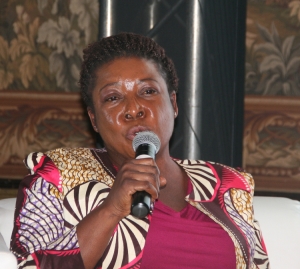
The Sunday Mail

Women in local business say limited access to funding and failure to breakthrough into lucrative markets are the major impediments to the growth of their ventures.

Securico founder and managing director Divine Ndhlukula
A business conference for women entrepreneurs held in Harare last week concluded that women are still being marginalised when seeking business in the same markets as their male counterparts.
The women said men were more likely to clinch business deals ahead of them since, in most cases, the person they seek to do business with are males.
They say the situation is giving men a competitive advantage as it is easy to strike a common understanding with those of the same sex.
These sentiments came out at the United Nations Women Entrepreneurship Day (WED) where seasoned women entrepreneurs and aspiring business women came together to share business experiences.
Securico founder and managing director Mrs Devine Ndhlukula said while the economy presents opportunities for business growth, the culture of treating men ahead of women entrepreneurs is negatively affecting the latter.
“It is difficult to grow as women in business. The most difficulty women face is lack of markets, we are in a world where males dominate in most decision making positions,” said Mrs Ndhlukula.
“If we do not support each other, the women empowerment agenda will remain only an agenda and we will never see this come to fruition.”
According to the United Nations, between 45 and 80 percent of the food in developed countries is produced by women who constitute the largest part of farm labour.
But due to lack of ready markets, fresh produce usually goes to waste.
Studies have shown that if female farmers were given equal access to funding and training, agricultural yields could improve by 20 percent.
The International Labour Organisation (ILO) says women are responsible for 60 percent of Africa’s production, but the Gender Gap Survey shows that in Africa and the Middle East, only six percent women are represented in formal employment.
Studies show that in Zimbabwe, one in five of the national workforce is a woman and less than one percent of women are in decision making or leadership positions.
“Stereotype, stigma against women-led enterprises and corruption also plays a part in the side lining of women’s access to markets, funding and financial advice, thereby fuelling inequalities in business,” said Mrs Ndhlukula.
She said most women across the country are skilled, produce quality goods and services, but the lack of access to markets and funding from financial institutions is reducing their business growth.
WED Youth Ambassador, Ms Theresa Muchinguri said investor confidence in women is still low, a situation that reduces their chances of establishing big corporations. She said this is confining them into “accepted” sectors such as catering, dress making and nursing.
“There is too much stigma in our societies that forces women to take up roles in other sectors outside their areas of expertise, even with the required training,” said Ms Muchinguri, adding that it is sad to note that of the registered small scale miners in Zimbabwe, only five percent are women.
“This is despite the fact that institutions of higher learning are churning out women graduates every year with technical expertise in mining engineering.”
Ms Muchinguri said the family – which is the first stage of socialisation – was biased towards males, resulting in parents grooming their sons to lead the family businesses, leaving out their daughters.
“We always hear of (business ventures with names such as) Dube and Sons, not daughters. That alone shows sons get precedence over daughters in business,” said Ms Muchinguri.
Women entrepreneurs at the WED said it is paramount to change society’s mindset that men are superior to women. WED ambassador, Mrs Natalie Jabangwe Morris said the idea of the conference was to bring to the forefront the conversation around supporting, empowering and celebrating women entrepreneurs.
“Zimbabwe has done a lot as a country in putting women at the forefront. It is time however, that Zimbabwean women’s agenda on entrepreneurship and empowerment is placed on the global agenda where our local talent will be celebrated, recognized and supported,” she said.
Aspiring women entrepreneurs at the celebration were appreciative of the conference, saying it had inspired them to break the walls of conformity and seek business growth.
However, some felt the event would have been more meaningful if held in rural areas where there is lack of access to information and discrimination against women is prevalent.
“The people meant to be inspired by this event are not even here (at the celebrations). Those present have either made it, or on their way and know where to get information.
“I think our mothers in the rural areas are the ones who need this more than the ones here today,” said Ms Chipo Nyagweta.
Small to medium women enterprises have received substantial support from Government in terms of favourable policies, financial aid and capacity building.
However, like many across Zimbabwe’s mainstream and informal economies, women SMEs have seen a steady decline in sales due to reduced consumer spending.
The annual WED was launched by the United Nations last year.
Zimbabwe began celebrating the day this year, joining 144 other countries.



